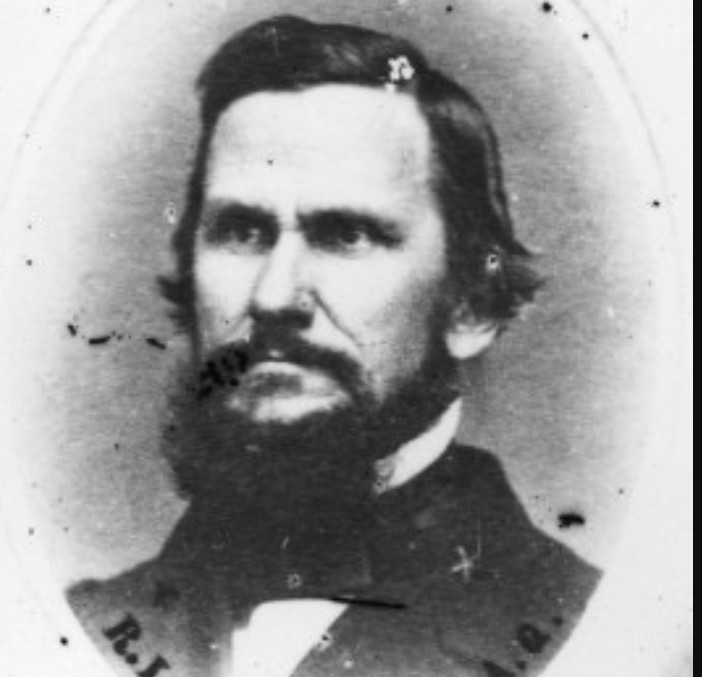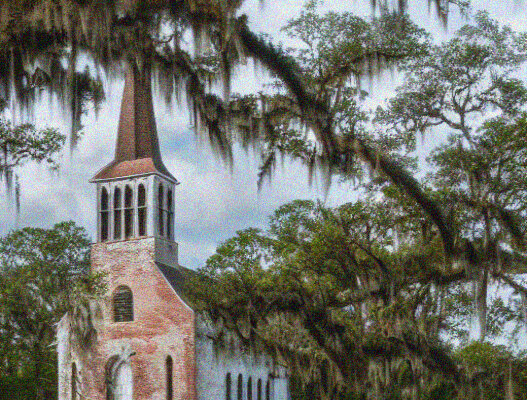The phone did not stop ringing Monday morning, and it hadn’t stopped ringing since Sunday afternoon. The views on social media were record setting for a simple sermon, and the comments were as vile as you would expect. But it had to be done, it wasn’t just honest, it was the truth, it was God’s truth. It was a “Gospel issue,“ the Bishop choosing a phrase that had driven him insane every time he had heard it from the biblically illiterate, from those caught in the pietism of the World, religious folk that had ordered their speech to justify the Church’s abandonment of sound teaching, in hopes it would make them appear more palatable to the godless. But, in reality, it had made the churches that embraced this type of pestilence ideologically apostate.
For too long there had been an enchantment placed upon the people of the South, a mystical curse that had beaten them down for the past 160 years, repeated over and over so regularly that they had finally agreed with the demonic forces that had bewitched them. It was the Bishop’s purpose to break that enchantment, to loose them from this curse the only way it could be done, by the power of the Holy Spirit and through the clear teaching of God’s Word. And he knew all the forces of Hell would come against him because of it. But he was prepared, not just prepared, but hoping for the onslaught. For when the Bible says, ”the gates of Hell shall not prevail against you,” it is from the position of attack, and the Bishop was about to join his brothers in an all-out assault.
He aligned his response to that which was coming, and he hoped it would split the ecclesiastical world of Dixie wide open. But he could not do it alone, so he gathered his allies in a secret meeting beforehand. As much as we have a distaste for the role of money in the Church, it is a reality, and the Bishop knew how to play the game. He had always maintained relationships with three of the wealthiest and most powerful men in South Carolina, all Citadel graduates, and he had confidence that they would stand by him financially when needed. Already they were secretly committed to the cause of sovereignty, and for the prospect that a distinctively Southern denomination may be the only way to save authentic Christianity in the South.
The time was set, the audience was assembled, and those with sympathies were placed in strategic locations among the congregants. And as a show of encouragement, Gideon had made the journey to attend the service. The Bishop was looking very sharp this Lord’s Day, his hair was freshly cut, and his beard was nicely trimmed, but instead of his ecclesial robe, he was fully dressed in his Confederate memorial tartan, with his great-great grandfather’s sword at his side, and his grandmother’s King James Bible in his hand. He was armed for battle, a battle against princes and principalities, demonic forces that had ruled over his people for too long. The next hour would be one that was remembered long into posterity, not just in his Low Country parish, but in written word, song, and the mythology of South Carolina.
His words were strong, impassioned, and deliberate. Using a personalized paraphrase from the Book of Galatians, Chapter Three and Verse One, he went to war, both in the heavens and on Earth.
“O foolish Carolinians, who has bewitched you that you should believe a lie, and what has enchanted you that you should slander your ancestors by calling that which God has not called evil, evil? And why have you turned from God and worshiped the idols of a godless nation? Are we all not slaves to Christ, are we all not bound to Our Lord, to serve him in whatever state in which we were born, whether rich or poor, bond or free, and are we not the Lord’s, bought with the price of His blood according to First Corinthians 7:17-24 Have we slipped so far into demonic egalitarian philosophy, that we now openly reject the words that the Lord God Jehovah has given us? So much that, we now love that which God hates, and hate that which God loves?”
“My brothers and sisters, let me make this very plain, as clear as the crystal water that springs from this very ground, like the waters that many of y’all swam in just down the road from here, when we were mere children and still loved and cherished our people.” The Bishop was remembering plunging from high aloft into a crystal-clear spring in his youth, and that feeling of exhilaration and fear as he jumped, the water being so clear that he did not know if he would splash into cool water, or go crashing to his doom on a waterless sandy bottom. That was exactly the emotion he was experiencing at this moment. Then, with miraculous indignation, his passions ignited, and his voice thundering. He exclaimed!
“Your slave owning ancestors were not evil, and to say they were is a denial of the very Word of God you testify to love, it is a devilish bewitching!”
There was a momentary silence, and for once, not a single soul was nodding off in the congregation. From the back of the chapel, an “amen” sounded, not loud, but loud enough, and heads turned. It was one of the Bishop’s benefactors, a man from a very wealthy, well respected, and old Low Country family. And with that affirmation, the Bishop found the courage he needed to continue.
For nearly forty-five minutes, he waxed eloquently on the master/slave relationship throughout the Bible, from Commandment Ten, that forbids the coveting of another’s manservant, the laws regarding Hebrew and foreign slaves, the relationship of Christ and the servant status of the Church, and how the writers of the New Testament and the Apostles referred to themselves as slaves in and for Christ. He destroyed the myth that slavery in the South was much harsher than allowed by the Scriptures, and demonstrating from the factual evidence, how no serious person, upon examination, should dispute the truth of it. The Bishop recalled the fondness of Paul to slave-owning Philemon on this very issue, regarding him as a man of respect and virtue, a leader in the Church, and how far removed that is from the way the godless, and even some in this very congregation, regarded their slave-owning ancestors. He meant to shame those that had betrayed their people, not just those present, but also to a wider Southern audience, and by the body language of those in attendance, he was succeeding.
But he saved the best for last, one that puts a nail in the coffin of those that would slander the men who did their best to civilize an institution under the laws of God, an economic system that has existed from the dawn of mankind.
“Let as many servants that are under the yoke count their own masters worthy of all honour, that the name of God and his doctrine be not blasphemed. And they that have believing masters, let them not despise them, because they are brethren; but rather do them service, because they are faithful and beloved, partakers of the benefit. These things teach and exhort. If any man teaches otherwise, and consent not to wholesome words, even the words of our Lord Jesus Christ, and to the doctrine which is according to godliness; he is proud, knowing nothing, but doting about questions and strifes of words, whereof cometh envy, strife, railings, evil surmisings, perverse disputing of men of corrupt minds, destitute of the truth, supposing that gain is godliness, from such withdraw thyself.“
Coming to a close, the Bishop was now exhausted and with a sorrow in his voice, as if Jeremiah the weeping prophet was now addressing the congregation himself. He gently asked those listening, to examine with honesty the words before them. For if these instructions were the words of God, then the defamation of their ancestors could no longer be tolerated. Therefore, they must oppose those that suggested differently, and they must withdraw themselves from that company, as the Apostle commanded. His last words to the congregation were simple, a call to repentance, a call to remembrance for their godly ancestors, and a call for a fervent restoration of the reputations of those that had been maligned over the recent years.
After the benediction, the Bishop conversed with his congregation as they left the chapel. He found them reflective and sober, but it was evident the bewitchment had been attacked, and the enchantment that had paralyzed our people for so long was being broken.
As the crowd thinned, Gideon appeared, his eyes bright with approval, and his arms open to embrace the Bishop in brotherly compassion. Two parts to Gideon’s plan were now in play, and the rest were about to be revealed.
Deo Vindice!
God save the South!

Service to God and honor to the South.






Excellent, sir. You’ve done your namesake proud in this article!
Humbled
No doubt you’re familiar with Thornwell’s irrefutable ‘The Church and Slavery’. They never should have stopped preaching it. Many minds have been numbed, but this is a good beginning!
Yes I am, and you are correct.
I liked this. Liked the set up for a sequel too
Is this church in the Charleston area? Would love to attend.
This is a “fictional” representation of present and future events.
Stay tuned! I think I’m putting the rest in a stand alone book.